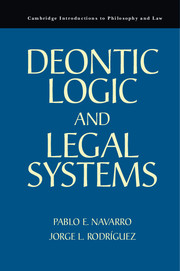5 - Legal Indeterminacy: Normative Gaps and Conflicts of Norms
Published online by Cambridge University Press: 05 October 2014
Summary
Formal Properties of Applicable Systems
The main task performed by lawyers and legal scholars is the identification of the applicable systems of norms used to develop solutions to legal cases. In the previous chapter, we claimed that the set of externally applicable norms has to be distinguished from the set of valid norms. In virtue of the “open nature” of law, applicable norms need not belong to the same system that provides the criteria of applicability. However, what is the relation that confers systematic structure to the set of externally applicable norms? As applicable norms are not necessarily valid norms, the criterion of legality seems to be inappropriate for determining the structure of such systems. On the contrary, the criterion of deducibility plays a crucial role here, because the logical consequences of general applicable norms are essential for the solution of legal problems.
In Normative Systems, Alchourrón and Bulygin developed a methodology for the analysis of legal problems that seems particularly suitable for applicable systems. In their view, legal problems are questions regarding the normative status of a certain action or set of actions. They illustrate their analysis with an example borrowed from Argentinean Law: the recovery of real estate from a third-party holder that obtained it from someone who was not its owner. Such an action may take place under a certain set of situations or states of affairs, which will be called universe of discourse (UD). The elements of a certain UD are the states of affairs that share a certain property, which is the defining property of that UD. The relevant normative question in this example is whether – and if so, in what circumstances – the third-party holder has the obligation to restore it to its owner, and in what circumstances (if any) is she allowed to retain it. The answers to these questions are dependent on the contents of the legal system under consideration: both legal problems and solutions are always relative to a certain legal system (here, Argentinean Law) that provides the starting point for identifying the applicable norms. However, legal scholars do not need to consider the whole set of valid legal norms at a certain time to find the answer to a problem such as this.
- Type
- Chapter
- Information
- Deontic Logic and Legal Systems , pp. 150 - 195Publisher: Cambridge University PressPrint publication year: 2014

